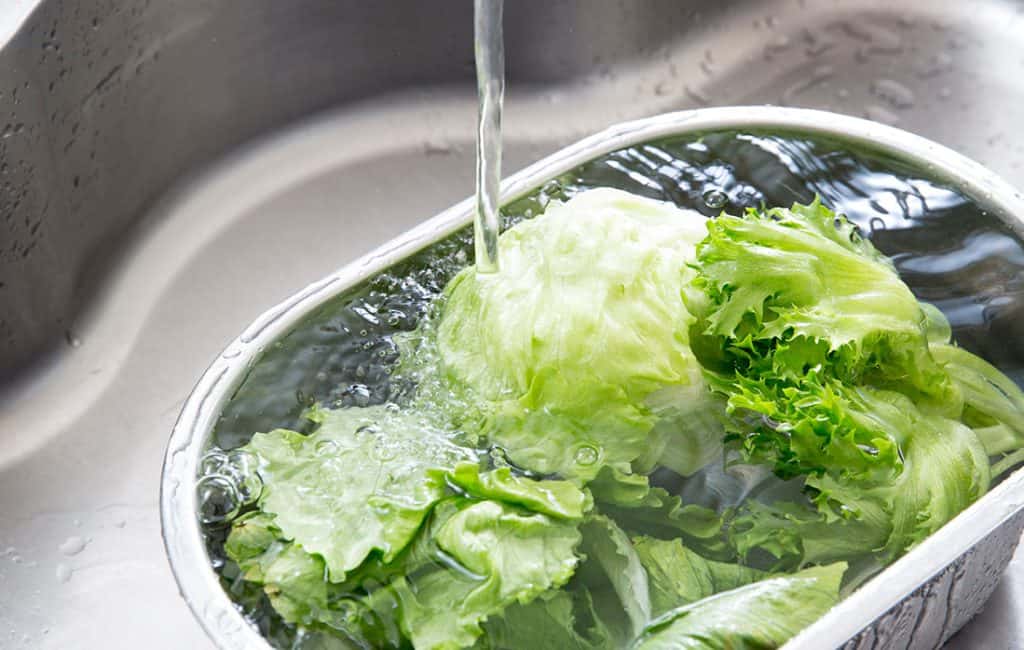
If you’ve been staying on top of social media health trends lately, you may have seen conversations around lettuce water and sleep. If you’re asking yourself what exactly lettuce water is and whether the claim about its benefits for sleep is true, you’re in the right place. Is it called a “bed of lettuce” for nothing? Let’s examine how much truth there may be to using lettuce water as a natural sleep aid.
Lettuce and Sleep
The idea of lettuce water-induced sleepiness originated on social media, but some research has been done on the possible sleep-promoting effects of certain lettuce components. One of these is called lactucarium, the milky white substance you can see at the base of certain types of lettuce stems.
A 2022 meta-analysis examined the effectiveness of non-medication interventions to help improve sleep during pregnancy. In addition to things like music, exercise, and acupressure, consuming lettuce seed was found to be helpful.[1] Still, the research on lettuce in any form and sleep is limited, and it’s a stretch to apply it to lettuce water for the general population.
How to Make Lettuce Water for Sleep
There are two main ways to make lettuce water. First, you can boil lettuce leaves of your choice, remove the solids, and pour the remaining liquids into a mug to sip warm before bed. Alternatively, you can place lettuce leaves in a mug and pour boiling water over them, steeping for 5-10 minutes like a hot tea. Remove the lettuce and drink the liquid.
Does Lettuce Water Really Help You Sleep?
The question on everyone’s mind: Does drinking lettuce water before bed really work? Why do people on TikTok think it does?
The short answer: We don’t have enough relevant evidence to say that it does.
Lettuce water advocates frequently cite one 2017 study published in the journal Food Science and Biotechnology for sleep. It’s important to note that this study was conducted using mice, so it shouldn’t be assumed the results would translate to humans.
In the study, the authors were interested in the sleep-promoting effects of lettuce extracts containing lactucin, a bitter substance found in lettuce that is known to have pain-relieving and sedative properties, on pentobarbital-induced sleep.[2]
However, many citing this study don’t mention that lettuce extract is not what was used to put the mice to sleep — phenobarbital, a medication used to slow your brain and nervous system, was. So, saying that lettuce extract is sleep-inducing based on this study is inaccurate. Furthermore, the point of the study wasn’t to determine if lettuce water induced sleep. It was to see if lettuce extracts helped induce longer sleep duration in the mice.
Overall, the authors concluded that romaine lettuce contains antioxidants that may have more protective effects from damage caused by sleep disturbance than other lettuce varieties. They also observed that concentrated extracts, not lettuce soaked in water, helped lengthen how long mice given phenobarbital slept.
The extracts came from fresh romaine leaves that were washed, dried, turned into powder, and then extracted twice with 70 percent ethanol — that’s a pretty big leap from most of us are capable of whipping up in the kitchen.
Another 2021 study found that green lettuce extract improved non-rapid eye movement sleep and stress-induced sleep changes among mice. The authors suggested quercetin-3-glucuronide as the primary lettuce compound responsible.[4] But again, this was another animal study using lettuce extract — not lettuce water with humans.
The TLDR: Overall, there is not enough research to determine how much lactucin a human would need to consume, and how to achieve the dosage from making lettuce water, to have sleep-promoting effects.
What Does Lettuce Water Taste Like?
On to the next most important question: how does lettuce water taste? Pretty much how you would imagine — like hot water with a mild plant flavor. Lettuce itself is comprised of around 96 percent water.
The Side Effects Of Lettuce Water
Ultimately, lettuce water is an innocuous beverage unlikely to cause noticeable side effects in most people. Consider buying organic lettuce to reduce pesticide exposure and scrub the dirt from any leaves before preparing. Note that lettuce water is still a liquid, and if you consume it close to bedtime, you’ll probably wake up at least a couple of times to relieve your bladder.
The Best Way to Use Lettuce For Sleep
There’s no solid evidence that drinking lettuce water before bed will help you sleep. If it does make you sleepy, there’s a chance it’s because the process of boiling lettuce to make a bland lettuce concoction is pretty boring!
There’s nothing wrong with lettuce, though. In fact, leafy greens are among the healthiest foods on the planet, particularly when enjoyed in their whole form — you’re more likely to take in micronutrients that affect sleep from eating them the way we usually do! Make a big salad for the week ahead, or layer some lettuce leaves on a sandwich for lunch. This way, you get the fiber plus more of the vitamins and minerals lettuce offers.
Alternatives to Lettuce Water For Sleep
Despite the lack of evidence for lettuce water and sleep, many people find that drinking a hot beverage later in the day can help prepare them for rest. Some of the most common options include hot tea and warmed milk.
Other alternative sleep remedies that probably work better than lettuce water include tart cherry juice, melatonin, lavender aromatherapy, or valerian root with lemon balm, maybe even garlic under your pillow![5][6][7][8] Practicing consistent sleep habits, as well as creating a sleep-promoting environment in your bedroom and not using technology within two hours of bedtime are also good practices for sleep support.[9] If you’re concerned about your sleep pattern, it’s always best to speak with your healthcare provider.
FAQs
Does lettuce cause sleepiness?
Despite the viral lettuce water for sleep TikTok hack, there is no scientific evidence that lettuce causes sleepiness. The hack probably stems from the fact that lettuce contains lactucarium, which may have sedative properties; however, the amount of it that’s found in lettuce would likely not be enough to have any sort of sleep-inducing impact.
Is lettuce good to eat before bed?
There isn’t currently any scientific evidence that says eating lettuce before bed will help you sleep, so there likely isn’t a good reason to eat it before you go to sleep. However, if you’re hungry and in need of a snack, more commonly recommended snacks include cherries, nuts, and yogurt.
The Last Word From Sleepopolis
Does lettuce water work as an effective sleep aid? Probably not, but there’s no harm in giving it a try. More likely, you’re experiencing a placebo effect from reading about other experiences. A couple of lettuce leaves needed to make lettuce water are unlikely to contain enough lactucin to affect your sleep pattern. You’re better off eating a salad and practicing basic sleep hygiene habits, staying hydrated, or trying alternative beverages with more evidence to support their sleep-promoting potential.
References
- Paulino DSM, Borrelli CB, Faria-Schützer DB, Brito LGO, Surita FG. Non-pharmacological Interventions for Improving Sleep Quality During Pregnancy: A Systematic Review and Meta-Analysis. Intervenções não-farmacológicas para melhoria da qualidade do sono durante a gravidez: Uma revisão sistemática e metanálise. Rev Bras Ginecol Obstet. 2022;44(8):776-784. doi:10.1055/s-0042-1746200
- Kim HD, Hong KB, Noh DO, Suh HJ. Sleep-inducing effect of lettuce (Lactuca sativa) varieties on pentobarbital-induced sleep. Food Sci Biotechnol. 2017;26(3):807-814. doi:10.1007/s10068-017-0107-1
- Lazarus M, Chen JF, Huang ZL, Urade Y, Fredholm BB. Adenosine and Sleep. Handb Exp Pharmacol. 2019;253:359-381. doi:10.1007/164_2017_36
- Jo K, Kim S, Ahn Y, Suh HJ. Effects of Green Lettuce Leaf Extract on Sleep Disturbance Control in Oxidative Stress-Induced Invertebrate and Vertebrate Models. Antioxidants (Basel). 2021;10(6):970. Published 2021 Jun 17. doi:10.3390/antiox10060970
- Fatemeh G, Sajjad M, Niloufar R, Neda S, Leila S, Khadijeh M. Effect of melatonin supplementation on sleep quality: a systematic review and meta-analysis of randomized controlled trials. J Neurol. 2022;269(1):205-216. doi:10.1007/s00415-020-10381-w
- Davari H, Ebrahimian A, Rezayei S, Tourdeh M. Effect of Lavender Aromatherapy on Sleep Quality and Physiological Indicators in Patients after CABG Surgery: A Clinical Trial Study. Indian J Crit Care Med. 2021;25(4):429-434. doi:10.5005/jp-journals-10071-23785
- Shinjyo N, Waddell G, Green J. Valerian Root in Treating Sleep Problems and Associated Disorders-A Systematic Review and Meta-Analysis. J Evid Based Integr Med. 2020;25:2515690X20967323. doi:10.1177/2515690X20967323
- Taavoni S, Nazem Ekbatani N, Haghani H. Valerian/lemon balm use for sleep disorders during menopause. Complement Ther Clin Pract. 2013;19(4):193-196. doi:10.1016/j.ctcp.2013.07.002
- Tähkämö L, Partonen T, Pesonen AK. Systematic review of light exposure impact on human circadian rhythm. Chronobiol Int. 2019;36(2):151-170. doi:10.1080/07420528.2018.1527773



























